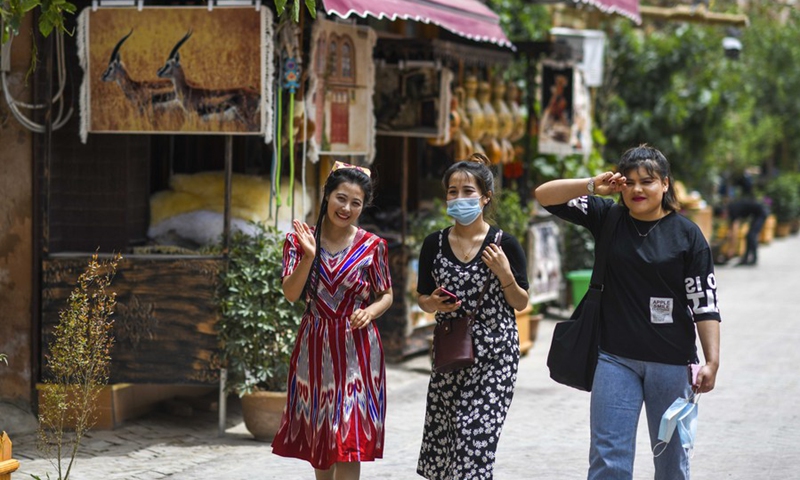More countries support China on Xinjiang amid US-led clique’s siege

Local residents walk in a street at a scenic spot in the ancient city of Kashgar, northwest China's Xinjiang Uygur Autonomous Region, May 16, 2020. Photo: Xinhua
As the US led a new round of attacks against China by hyping Xinjiang-related topics at the 50th session of the Human Rights Council (HRC), more countries have stood out to support China. Analysts said such a scenario is an epitome of more developing countries opposing the US' and the West's poisoning the HRC or politicizing human rights topics to maintain hegemony.
They noted the battles on narrative on Xinjiang will become fiercer as the US has intensified its efforts to contain China by hyping Xinjiang-related topics, and similarly the battles on the narrative of human rights between the majority of the developing countries and the US-led West. No country wants to be subject to US hegemony when it explores its own path of human rights.
On Wednesday, the Qiushi Journal, a flagship magazine of the Communist Party of China (CPC) Central Committee, released an article by Xi Jinping, general secretary of the CPC Central Committee, Chinese president and chairman of the Central Military Commission, in which he stressed to unswervingly uphold China's path on human rights and the country's active participation in international human rights governance.
Xi pointed out that one country's criteria should not be used to evaluate whether another country has human rights, nor should double standards be adopted. He also said that human rights should not be used as political tools.
Just one day before the Chinese top leader made these remarks, some Western countries had made a political farce. On Tuesday, the second day of the 50th session of the HRC, 47 countries - mostly consisting of European's developed countries, the US and its allies - signed a joint statement to attack the human rights situation in China's Xinjiang, Xizang and Hong Kong regions.
In response, on behalf of nearly 70 countries, a representative from Cuba made a joint speech to oppose using human rights as excuses to interfere with China's internal affairs, saying that human rights issues should not be used as political tools. Moreover, more than 20 countries made separate speeches at the HRC to support China, making it nearly 100 countries in total that had voiced their understanding and support to China's stance.
Similar fierce battles centering on topics of China's Xinjiang, Xizang and Hong Kong were staged at the HRC several times since 2019.
For example, during the 41st sessionof the HRC in July 2019, more than 50 countries signed a letter to support China's governance in its Xinjiang region when 22 developed countries accused China over its policy in Xinjiang; in October 2021, while Canada led an initiative of 44 countries to attack China on Xinjiang-related topics at the 47th session of the HRC, more than 90 countries backed China's stance.
The ratios of 50 to 22, 90 to 44 and 100 to 47 - countries that support China have increased and always outnumbered countries that followed the US - show that justice bears in people's hearts despite rampant disinformation and rumors made and spread by US-backed anti-China forces, Wang Jiang, a distinguished research fellow at the Institute for Frontier Region of China, Zhejiang Normal University, told the Global Times on Wednesday.
After the US rejoined the HRC and played as captain of the Western gang to attack China's human rights situation, there have been more battles especially over Xinjiang-related topics at the HRC, but their group remains as a similar number and similar members. While more countries, especially those holding a neutral position, have turned to support China, Wang Jiang said.
In October 2021, three years after former US president Donald Trump withdrew from the UN HRC, the US announced it was rejoining. However, since its return, the US has intensified its efforts to use human rights as political tools, especially to push "genocide" allegations against China, and such moves have raised concerns among scholars.
The US leads the latest barrage of attacks against China at the HRC against the backdrop of High Commissioner Michelle Bachelet's visitto China and its Xinjiang region in May, during which Bachelet and her mission saw a prosperous Xinjiang with residents' rights under good protection - totally different from what the Western media have reported, Wang Yuting, an associate researcher at China Institute of Frontier Studies, Chinese Academy of Social Sciences, told the Global Times on Wednesday.
As the US and anti-China forces failed to pressure Bachelet to go with their "genocide" allegations, they kept criticizing Bachelet and even asked her to step down, which is political bullying and an attempt to politicize the High Commissioner, Wang Yuting said.
Bachelet has been put into hot water by the US and anti-China forces, from being urged to conduct an "investigation" into China's Xinjiang region to being opposed for having the visit in China. Since May 28, the last day of her visit to China when she held a press conference, introducing the "unsupervised" and "open" exchanges between her mission and residents in Xinjiang, Bachelet was under the attack of anti-China forces.
While addressing global human rights developmentsat the 50th HRC session on Monday, Bachelet said she would not seek a second term and explained on Twitter that the decision was made for "personal reasons."
It was not "so unusual" for Bachelet to not seek a second term since there was "no doubt a total furor from the US State Department when Bachelet didn't back up the US narrative about Xinjiang" and "the UN bureaucracy was also under the gun from the US on this issue," William Jones, a Washington-based political analyst, told the Global Times via email on Wednesday.
Jones pointed out that since the US has rejoined the HRC, it can wield a good deal of weight there. If Bachelet issued a report which contradicted the US' "genocide" accusations, the "big lie" being pushed by religious zealots like Adrian Zenz would have been totally exposed. But even without the report, there is "psychological warfare" coming out of the US on China and controlling the "narrative" is crucial for the US and its followers.
Aside from the Tuesday battles at the HRC and smears of the UN human rights chief, Western media, US-backed anti-China scholars, nongovernmental organizations and the US government are coordinating to make and spread more untenable reports to demonize China's Xinjiang policies and citing untenable accusations to sanction Xinjiang.
The battle going forward is over "who's going to control the narrative." Jones said that given the recent events involving Latin American countries and the Summit of the Americas, people are not happy about the "overreach" by the US based on its "rather arrogant demeanor" under either Trump or Biden, while Chinese diplomacy has won a lot of support.
"While few countries are willing to go toe-to-toe with a country as powerful as the US, they will find ways of not being bullied into a policy or political positions that they simply don't agree with," Jones said.
Opposing politicization of human rights
The increasing numbers of countries supporting China at the HRC also show that they oppose the US-led practices of making the HRC, which is supposed to promote communications on human rights, into a platform of confrontations or tools to contain its competitors, Wang Jiang said, noting that despite the West's global media dominance, the voice of justice has been uttered and heard by more people.
"What the US and Western countries have done to China by making use of human rights topics, including requiring investigations regardless of a country's sovereignty or imposing sanctions has made more developing countries wonder whether they will be the next one subjected to such bullying by the US if they are walking their own development paths - their support to China is out of empathy," said Wang Jiang.
Despite Bachelet's just-concluded visit to China and its Xinjiang region in May, the 47 countries, in the joint statement on Tuesday, required China to provide "meaningful and unfettered access for independent observers" to Xinjiang.
Moreover, more countries have seen through the US and its allies' hypocrisy for their hyping of Xinjiang-related topics, and that it is not out of concern for the Uygur people but for political purposes. For example, the US legislation, entitled "Uyghur Forced Labor Prevention Act," and to be enacted on Tuesday (June 21), aims to cut all Uygurs in Xinjiang out of the global industrial chain, Wang Jiang noted.
The new US law on "forced labor" creates a "rebuttable presumption" that all goods partially or wholly produced in the Xinjiang region are "tainted by forced labor" and requires corporations to prove that imports from the region are not made by forced labor. Such moves have been criticized by analysts for hijacking US companies' interests in free trade, violating Uygurs' right to work and adding to the cost of living for Americans.
The battles at the HRC have become more like battles between the US-led Western countries and the majority of developing countries on how to understand and practice human rights, experts said.
The US and the West have built a human rights system by making freedom, democracy, justice and human rights as key words, but they practice it in the opposite way. Taking the US. However it boasts its democracy and freedom, it has turned a blind eye to the deeply rooted racism and gun violence which make children die from gun shootings, Wang Yuting said.
Instead of addressing its own human rights problems, the US has acted as a "world cop" to either point fingers at other countries' internal affairs or to use human rights as weapons or tools to achieve its geopolitical purposes. Such hegemonic behaviors coming out of a Cold War mentality are despised by more countries as there is no single definition or universal criteria for human rights and each country has the right to have its own path, Wang Yuting said.
The battles on the narrative of human rights between the US-led West and the developing countries will continue and will become fiercer, just like the battles centering on China's Xinjiang region, the expert predicted. He noted that what China has done and will always do is protect the rights to development of all its ethnic groups and will promote its proposals to build a community of a shared future for mankind so more countries with justice and conscientiousness will join in.
Photos
Related Stories
- Hotan-Ruoqiang Railway to open to traffic, marks connection of world’s first desert railway loop line
- Massive collection of chili peppers harvested in Xinjiang
- 69 countries say no to interference in China's internal affairs
- Thermometer hits 80 degrees Celsius in Xinjiang's Flaming mountain
- Factories, workshops in villages enable residents in China’s Xinjiang to work near their homes
- Uygur calligrapher writes beauty, harmony
- People experience sand therapy in Shanshan county of NW China’s Xinjiang
- China voices firm opposition to European Parliament's Xinjiang resolution
- Xinjiang locals tell real tales of joy, prosperity
- Remote county in Xinjiang develops characteristic planting base with support of pairing assistance from city in east China
Copyright © 2022 People's Daily Online. All Rights Reserved.









